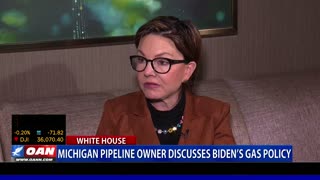Premium Only Content

Biden's Tax Policy: Mileage Tax and Income Tax Changes, Explained
The House Democrats' $2 trillion Build Back Better Act could be supported into law quickly, conveying with it a host charge changes. The basic government backed retirement net expansion is eventually in the Senate, where it's relied upon to be reevaluated before being transported off Joe Biden's workspace for stamping.
From additional costs on changed gross accessible
Pay beyond what many would consider possible on SALT recompenses, here are the likely aftereffects of the bill's proposed charge changes.
Individual cost changes would influence rich Americans
The organized evaluation changes would by and large impact prosperous Americans. As of now, the nation has a 37 percent charge on changed gross compensation for individuals obtaining more than $10 million consistently. The Build Back Better Act powers a surtax of 5
percent and an additional 3 percent for people
securing more than $25 million. The surtax is depended upon to raise $230 billion all through the accompanying
decade.
At the present time, the bill similarly consolidates a brief
help in the public authority induction for state and neighborhood
charges, known as SALT, from $10,000 to $80,000. Associations that report more than $1 billion in yearly pay to their financial backers for three progressive years would be committed to a base obligation of 15% under the Build Back Better Act. It would similarly widen the nation's notable redesigned youth tax reduction until 2022.
Work Back Better would fabricate capital expansion charge rates
Long stretch capital augmentations are achieved on assets that have rose in regard and are sold after over a drawn out time of ownership. Long stretch capital increments would be charged at a top government speed of 25%, up from the current speed of 20%. When gotten together with the present 3.8 percent surtax on net endeavor pay, the overall tax assessment rate would be 28.8 percent. It's surveyed that these activities will cost up to $3.5 trillion. Transient capital increments would be subject to standard individual obligation rates.
Biden's proposed bill would trouble an asset's appreciation when its owner fails horrendously. This would hold the rich back from passing on their stock and other money related assets for the bleeding edge with essentially zero cost results.
President Biden
Today, the House passed my Build Back Better Act. I offer thanks toward Speaker Pelosi, House organization, and people who locked in and projected a voting form to pass this bill.
By and by, it goes to the United States Senate, where I expect it passing
Biden proposes mileage charge
The Build Back Better Act also proposes a vehicle mileage charge trial run program. Individuals would log the amount of miles driven in voyager and business vehicles and pay charges subject to the amount of miles driven. Enrollment would be optional, and all individuals would be absolutely compensated for any costs paid. At whatever point embraced, the program would run from 2022 to 2026.
The proposed mileage charge is planned to upgrade and finally replace gas charges, which have declined generally recently as
gas mileage has extended and electric vehicle
ownership has rapidly expanded. In any case, it's difficult to expect how these suggestions mav
change as the Senate starts trades. Various financial guidance propose keeping it together for the last
authorization before making any critical decisions.
-
 2:24
2:24
KGTV
3 years agoSan Diego Parking Requirement policy changes
12 -
 5:09
5:09
The Wayne Dupree Podcast
3 years agoKennedy Blames Biden's Border Policy Changes For Current Crisis
9207 -
 2:27
2:27
Dinesh D'Souza
3 years agoTrump Dismantles Biden's Ridiculous Border Policy
17.8K67 -
 2:31
2:31
One America News Network
3 years agoMich. pipeline owner discusses Biden's gas policy
1.92K20 -
 1:58:22
1:58:22
The Charlie Kirk Show
2 hours agoCharlie vs. Gavin Newsom | Jonathan "Lomez" Keeperman | 3.6.25
50.3K14 -
 DVR
DVR
Simply Bitcoin
2 hours ago $0.26 earnedCould The NEXT 24 Hours Change The 2025 Bitcoin Bull Market? | EP 1197
5.08K3 -
 49:57
49:57
The Dan Bongino Show
4 hours agoAnother Phony Narrative Crumbles + First Show In The New Studio! (Ep. 2437) - 03/06/2025
619K1.71K -
 44:26
44:26
The Rubin Report
3 hours ago'Real Time' Crowd Stunned by Bill Maher’s Unexpected Glaring Blind Spot
44.2K36 -
 1:45:31
1:45:31
Benny Johnson
3 hours agoDeep State PURGE: CIA Agents STRIPPED of Badges as Trump DISMANTLES Dept of Education | Dem CENSURED
79.6K86 -
 55:56
55:56
Grant Stinchfield
2 hours ago $0.91 earnedWhat Happened to the Mystery Drones? They Don't Just Disappear, or do They?
21.7K3